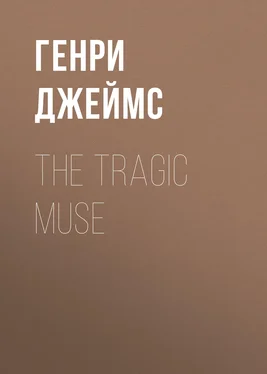Генри Джеймс - The Tragic Muse
Здесь есть возможность читать онлайн «Генри Джеймс - The Tragic Muse» — ознакомительный отрывок электронной книги совершенно бесплатно, а после прочтения отрывка купить полную версию. В некоторых случаях можно слушать аудио, скачать через торрент в формате fb2 и присутствует краткое содержание. Жанр: foreign_antique, foreign_home, cinema_theatre, на английском языке. Описание произведения, (предисловие) а так же отзывы посетителей доступны на портале библиотеки ЛибКат.
- Название:The Tragic Muse
- Автор:
- Жанр:
- Год:неизвестен
- ISBN:нет данных
- Рейтинг книги:5 / 5. Голосов: 1
-
Избранное:Добавить в избранное
- Отзывы:
-
Ваша оценка:
- 100
- 1
- 2
- 3
- 4
- 5
The Tragic Muse: краткое содержание, описание и аннотация
Предлагаем к чтению аннотацию, описание, краткое содержание или предисловие (зависит от того, что написал сам автор книги «The Tragic Muse»). Если вы не нашли необходимую информацию о книге — напишите в комментариях, мы постараемся отыскать её.
The Tragic Muse — читать онлайн ознакомительный отрывок
Ниже представлен текст книги, разбитый по страницам. Система сохранения места последней прочитанной страницы, позволяет с удобством читать онлайн бесплатно книгу «The Tragic Muse», без необходимости каждый раз заново искать на чём Вы остановились. Поставьте закладку, и сможете в любой момент перейти на страницу, на которой закончили чтение.
Интервал:
Закладка:
"Well take a walk—I should like that," Nash replied. "I shall smoke a cigar at the café on the corner of the Place de l'Opéra—you'll find me there." He prepared to compass his own departure, but before doing so he addressed himself to the duty of a few civil words to Lady Agnes. This effort proved vain, for on one side she was defended by the wall of the room and on the other rendered inaccessible by Miriam's mother, who clung to her with a quickly-rooted fidelity, showing no symptom of desistance. Nash declined perforce upon her daughter Grace, who said to him: "You were talking with my cousin Mrs. Dallow."
"To her rather than with her," he smiled.
"Ah she's very charming," Grace said.
"She's very beautiful."
"And very clever," the girl continued.
"Very, very intelligent." His conversation with Miss Dormer went little beyond this, and he presently took leave of Peter Sherringham, remarking to him as they shook hands that he was very sorry for him. But he had courted his fate.
"What do you mean by my fate?" Sherringham asked.
"You've got them for life."
"Why for life, when I now clearly and courageously recognise that she isn't good?"
"Ah but she'll become so," said Gabriel Nash.
"Do you think that?" Sherringham brought out with a candour that made his visitor laugh.
" You will—that's more to the purpose!" the latter declared as he went away.
Ten minutes later Lady Agnes substituted a general, vague assent for all further particular ones, drawing off from Mrs. Rooth and from the rest of the company with her daughters. Peter had had very little talk with Biddy, but the girl kept her disappointment out of her pretty eyes and said to him: "You told us she didn't know how—but she does!" There was no suggestion of disappointment in this.
Sherringham held her hand a moment. "Ah it's you who know how, dear Biddy!" he answered; and he was conscious that if the occasion had been more private he would have all lawfully kissed her.
Presently three more of his guests took leave, and Mr. Nash's assurance that he had them for life recurred to him as he observed that Mrs. Rooth and her damsel quite failed to profit by so many examples. The Lovicks remained—a colleague and his sociable wife—and Peter gave them a hint that they were not to plant him there only with the two ladies. Miriam quitted Mrs. Lovick, who had attempted, with no great subtlety, to engage her, and came up to her host as if she suspected him of a design of stealing from the room and had the idea of preventing it.
"I want some more tea: will you give me some more? I feel quite faint. You don't seem to suspect how this sort of thing takes it out of one."
Peter apologised extravagantly for not having seen to it that she had proper refreshment, and took her to the round table, in a corner, on which the little collation had been served. He poured out tea for her and pressed bread and butter on her and petits fours , of all which she profusely and methodically partook. It was late; the afternoon had faded and a lamp been brought in, the wide shade of which shed a fair glow on the tea-service and the plates of pretty food. The Lovicks sat with Mrs. Rooth at the other end of the room, and the girl stood at the table, drinking her tea and eating her bread and butter. She consumed these articles so freely that he wondered if she had been truly in want of a meal—if they were so poor as to have to count with that sort of privation. This supposition was softening, but still not so much so as to make him ask her to sit down. She appeared indeed to prefer to stand: she looked better so, as if the freedom, the conspicuity of being on her feet and treading a stage were agreeable to her. While Sherringham lingered near her all vaguely, his hands in his pockets and his mind now void of everything but a planned evasion of the theatrical question—there were moments when he was so plentifully tired of it—she broke out abruptly: "Confess you think me intolerably bad!"
"Intolerably—no."
"Only tolerably! I find that worse."
"Every now and then you do something very right," Sherringham said.
"How many such things did I do to-day?"
"Oh three or four. I don't know that I counted very carefully."
She raised her cup to her lips, looking at him over the rim of it—a proceeding that gave her eyes a strange expression. "It bores you and you think it disagreeable," she then said—"I mean a girl always talking about herself." He protested she could never bore him and she added: "Oh I don't want compliments—I want the hard, the precious truth. An actress has to talk about herself. What else can she talk about, poor vain thing?"
"She can talk sometimes about other actresses."
"That comes to the same thing. You won't be serious. I'm awfully serious." There was something that caught his attention in the note of this—a longing half hopeless, half argumentative to be believed in. "If one really wants to do anything one must worry it out; of course everything doesn't come the first day," she kept on. "I can't see everything at once; but I can see a little more—step by step—as I go; can't I?"
"That's the way—that's the way," he gently enough returned. "When you see the things to do the art of doing them will come—if you hammer away. The great point's to see them."
"Yes; and you don't think me clever enough for that."
"Why do you say so when I've asked you to come here on purpose?"
"You've asked me to come, but I've had no success."
"On the contrary; every one thought you wonderful."
"Oh but they don't know!" said Miriam Rooth. "You've not said a word to me. I don't mind your not having praised me; that would be too banal. But if I'm bad—and I know I'm dreadful—I wish you'd talk to me about it."
"It's delightful to talk to you," Peter found himself saying.
"No, it isn't, but it's kind"; and she looked away from him.
Her voice had with this a quality which made him exclaim: "Every now and then you 'say' something—!"
She turned her eyes back to him and her face had a light. "I don't want it to come by accident." Then she added: "If there's any good to be got from trying, from showing one's self, how can it come unless one hears the simple truth, the truth that turns one inside out? It's all for that—to know what one is, if one's a stick!"
"You've great courage, you've rare qualities," Sherringham risked. She had begun to touch him, to seem different: he was glad she had not gone.
But for a little she made no answer, putting down her empty cup and yearning over the table as for something more to eat. Suddenly she raised her head and broke out with vehemence: "I will, I will, I will!"
"You'll do what you want, evidently."
"I will succeed—I will be great. Of course I know too little, I've seen too little. But I've always liked it; I've never liked anything else. I used to learn things and do scenes and rant about the room when I was but five years old." She went on, communicative, persuasive, familiar, egotistical (as was necessary), and slightly common, or perhaps only natural; with reminiscences, reasons, and anecdotes, an unexpected profusion, and with an air of comradeship, of freedom in any relation, which seemed to plead that she was capable at least of embracing that side of the profession she desired to adopt. He noted that if she had seen very little, as she said, she had also seen a great deal; but both her experience and her innocence had been accidental and irregular. She had seen very little acting—the theatre was always too expensive. If she could only go often—in Paris for instance every night for six months—to see the best, the worst, everything, she would make things out, would observe and learn what to do, what not to do: it would be a school of schools. But she couldn't without selling the clothes off her back. It was vile and disgusting to be poor, and if ever she were to know the bliss of having a few francs in her pocket she would make up for it—that she could promise! She had never been acquainted with any one who could tell her anything—if it was good or bad or right or wrong—except Mrs. Delamere and poor Ruggieri. She supposed they had told her a great deal, but perhaps they hadn't, and she was perfectly willing to give it up if it was bad. Evidently Madame Carré thought so; she thought it was horrid. Wasn't it perfectly divine, the way the old woman had said those verses, those speeches of Célie? If she would only let her come and listen to her once in a while like that it was all she would ask. She had got lots of ideas just from that half-hour; she had practised them over, over, and over again, the moment she got home. He might ask her mother—he might ask the people next door. If Madame Carré didn't think she could work, she might have heard, could she have listened at the door, something that would show her. But she didn't think her even good enough to criticise—since that wasn't criticism, telling her her head was good. Of course her head was good—she needn't travel up to the quartiers excentriques to find that out. It was her mother, the way she talked, who gave the idea that she wanted to be elegant and moral and a femme du monde and all that sort of trash. Of course that put people off, when they were only thinking of the real right way. Didn't she know, Miriam herself, that this was the one thing to think of? But any one would be kind to her mother who knew what a dear she was. "She doesn't know when any thing's right or wrong, but she's a perfect saint," said the girl, obscuring considerably her vindication. "She doesn't mind when I say things over by the hour, dinning them into her ears while she sits there and reads. She's a tremendous reader; she's awfully up in literature. She taught me everything herself. I mean all that sort of thing. Of course I'm not so fond of reading; I go in for the book of life." Sherringham wondered if her mother had not at any rate taught her that phrase—he thought it highly probable. "It would give on my nerves, the life I lead her," Miriam continued; "but she's really a delicious woman."
Читать дальшеИнтервал:
Закладка:
Похожие книги на «The Tragic Muse»
Представляем Вашему вниманию похожие книги на «The Tragic Muse» списком для выбора. Мы отобрали схожую по названию и смыслу литературу в надежде предоставить читателям больше вариантов отыскать новые, интересные, ещё непрочитанные произведения.
Обсуждение, отзывы о книге «The Tragic Muse» и просто собственные мнения читателей. Оставьте ваши комментарии, напишите, что Вы думаете о произведении, его смысле или главных героях. Укажите что конкретно понравилось, а что нет, и почему Вы так считаете.












